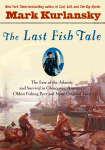

Gloucester on Cape Ann is the closest port to the Browns and Georges Banks, two of the richest fishing grounds in North America. Fishermen out of Gloucester could sail to the grounds, haul in the bounty and make reasonable livings by sharing the work, risks and profits. The version that tough, self-reliant Gloucester men tell is that fishing is a hard life but a "free" one.
Kurlansky looks behind the official version to deliver some other undeniable facts. Fishing may always have been risky, but he points out that innovations like the fast Gloucester fishing schooner tended to make life more, rather than less, dangerous. Records show that, between 1830 and 1900, 3,800 Gloucester fishermen and 670 schooners were lost at sea. Fishermen seemed to be a renewable resource: when one was gone, another showed up to take his place. Considering these statistics, it is no wonder that a whole genre of story-telling grew up--a Gloucester tale, Kurlansky tells us, is "a story of miserable irony in which things are shown in their worst light, . . . with a sad ending." Kurlansky retells many, and they are gruesome classics.
Gloucester's grit and salty authenticity were magnets for many who did not fish, too. Painters like Fitz Henry Lane, Winslow Homer and Edward Hopper came to create works that made the light and seascapes of Gloucester world-famous. Kurlansky continues solidly, if more modestly, in their tradition. His pen-and-ink illustrations lend charm throughout a book that also boasts recipes for Ciaramitaro's Christmas fig cookies, Skully-Jo Fish Bake and Miss E. Grover's Lobster Salad.
The Gloucester story changes dramatically for the worse with modern technology. As Kurlansky so eloquently states, in the late 20th century large trawlers gave fishermen "the ability to catch more fish than were available in the sea." With deft use of studies and statistics, he provides an informed, disturbing introduction to changing ocean ecology at the same time that he shows the pressures (including real estate fever) that have been brought to bear on life in Gloucester.
Able to channel the resilient spirit of a place that always looked to the sea, Kurlanksy has written what could be called a Gloucester love-letter, a tale of hardy survivors, not victims.--John McFarland

